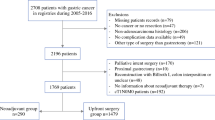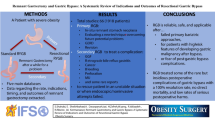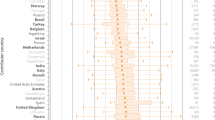Abstract
Background
Obesity is a well-established risk factor for cancer. Laparoscopic sleeve gastrectomy (LSG) is established as a safe procedure providing accelerated weight loss and comorbidity improvement or remission. Additionally, it is approved as a bridging procedure for various non-oncologic surgeries, with very limited data for oncologic procedures. The aim of this study is to present a series of patients with severe obesity and concomitant cancer who underwent LSG prior to definitive oncological procedure.
Methods
A retrospective review (2008–2023) was conducted in three institutions, identifying 5 patients with cancer and severe obesity who underwent LSG as bridging procedure. Variables analyzed were initial weight, initial body mass index (BMI), type of malignancy, comorbidities, interval between LSG and oncological surgery, weight and BMI before the second intervention, percentage of excess weight loss (%EWL), and postoperative morbidity and mortality.
Results
Malignancies identified were 2 prostate cancers, 1 periampullary neuroendocrine tumor, 1 rectal cancer, and 1 renal clear cell carcinoma. Mean age of patients was 50.2 years, mean initial BMI 47.4 kg/\({{\text{m}}}^{2}\), and mean BMI before oncological surgery 37 kg/\({{\text{m}}}^{2}\). Mean time interval between LSG and oncological surgery was 8.3 months. Mean %EWL achieved was 45.2%. Two thromboembolic events were encountered after LSG, while none of the patients developed complications after definitive oncological treatment. The mean follow-up after oncological surgery was 61.6 months.
Conclusion
LSG can be proposed as bridging procedure before oncological surgery in meticulously selected patients. Achieved weight loss can render subsequent oncological procedures easier and safer.
Graphical Abstract


Similar content being viewed by others
Data Availability
The data that support the findings of this study are available upon request from the corresponding authors (Rodrigue Chemaly, Claude Tayar and Bassem Safadi).
References
Iyengar NM, Gucalp A, Dannenberg AJ, et al. Obesity and cancer mechanisms: tumor microenvironment and inflammation. J Clin Oncol. 2016;34(35):4270–6.
Avgerinos KI, Spyrou N, Mantzoros CS, et al. Obesity and cancer risk: emerging biological mechanisms and perspectives. Metabolism. 2019;92:121–35.
Calle EE, Rodriguez C, Walker-Thurmond K, et al. Overweight, obesity, and mortality from cancer in a prospectively studied cohort of U.S. adults. N Engl J Med. 2003;348(17):1625–38.
Dharap SB, Barbaniya P, Navgale S. Incidence and risk factors of postoperative complications in general surgery patients. Cureus. 2022;14(11):e30975.
Plassmeier L, Hankir MK, Seyfried F. Impact of excess body weight on postsurgical complications. VIS. 2021;37(4):287–97.
Salminen P, Grönroos S, Helmiö M, et al. Effect of laparoscopic sleeve gastrectomy vs Roux-en-Y gastric bypass on weight loss, comorbidities, and reflux at 10 years in adult patients with obesity: the SLEEVEPASS randomized clinical trial. JAMA Surg. 2022;157(8):656–66.
Hess DS, Hess DW. Biliopancreatic diversion with a duodenal switch. Obes Surg. 1998;8(3):267–82.
Regan JP, Inabnet WB, Gagner M, et al. Early experience with two-stage laparoscopic Roux-en-Y gastric bypass as an alternative in the super-super obese patient. Obes Surg. 2003;13(6):861–4.
Eisenberg D, Bellatorre A, Bellatorre N. Sleeve gastrectomy as a stand-alone bariatric operation for severe, morbid, and super obesity. JSLS. 2013;17(1):63–7.
Eisenberg D, Shikora SA, Aarts E, et al. 2022 American Society for Metabolic and Bariatric Surgery (ASMBS) and International Federation for the Surgery of Obesity and Metabolic Disorders (IFSO): Indications for Metabolic and Bariatric Surgery. Surg Obes Relat Dis. 2022;18(12):1345–56.
Gianos M, Abdemur A, Szomstein S, et al. Laparoscopic sleeve gastrectomy as a step approach for morbidly obese patients with early stage malignancies requiring rapid weight loss for a final curative procedure. Obes Surg. 2013;23(9):1370–4.
Sung H, Ferlay J, Siegel RL, et al. Global Cancer Statistics 2020: GLOBOCAN estimates of incidence and mortality worldwide for 36 cancers in 185 countries. CA Cancer J Clin. 2021;71(3):209–49.
Obesity and overweight [Internet]. [cited 2023 Aug 14]. Available from: https://www.who.int/news-room/fact-sheets/detail/obesity-and-overweight. Accessed Sep 2023
Chemaly R, Nakhle M. Obesity and cancer: two sides of the same coin. Obes Surg. 2023;33(7):2253–4.
Pati S, Irfan W, Jameel A, et al. Obesity and cancer: a current overview of epidemiology, pathogenesis, outcomes, and management. Cancers. 2023;15(2):485.
Grönroos S, Helmiö M, Juuti A, et al. Effect of laparoscopic sleeve gastrectomy vs Roux-en-Y gastric bypass on weight loss and quality of life at 7 years in patients with morbid obesity: the SLEEVEPASS randomized clinical trial. JAMA Surg. 2021;156(2):137–46.
Deitel M. Overweight and obesity worldwide now estimated to involve 1.7 billion people. Obes Surg. 2003;13(3):329–30.
Zhou Y, Wu L, Li X, et al. Outcome of laparoscopic colorectal surgery in obese and nonobese patients: a meta-analysis. Surg Endosc. 2012;26(3):783–9.
Hussan H, Gray DM, Hinton A, et al. Morbid obesity is associated with increased mortality, surgical complications, and incremental health care utilization in the peri-operative period of colorectal cancer surgery. World J Surg. 2016;40(4):987–94.
Gabriel RA, Hylton DJ, Burton BN, et al. The association of preoperative haemoglobin A1c with 30-day postoperative surgical site infection following non-cardiac surgery. J Perioper Pract. 2019;30(10):320–5.
Blokhin IO, Lentz SR. Mechanisms of thrombosis in obesity. Curr Opin Hematol. 2013;20(5):437–44.
Li S, Luo X, Sun H, et al. Does prior bariatric surgery improve outcomes following total joint arthroplasty in the morbidly obese? A meta-analysis. J Arthroplast. 2019;34(3):577–85.
Dowsey MM, Brown WA, Cochrane A, et al. Effect of bariatric surgery on risk of complications after total knee arthroplasty: a randomized clinical trial. JAMA Netw Open. 2022;5(4):e226722.
Fernando S, Varma J, Dengu F, et al. Bariatric surgery improves access to renal transplantation and is safe in renal failure as well as after transplantation: a systematic review and meta-analysis. Transplant Rev (Orlando). 2023;37(3):100777.
Yemini R, Nesher E, Braun M, et al. Long-term outcomes of Roux-en-Y gastric bypass or sleeve gastrectomy in patients with cirrhosis; before, during or after liver transplantation: a single center’s experience. Clin Transplant. 2021;35(8):e14374.
Lee Y, Tian C, Lovrics O, et al. Bariatric surgery before, during, and after liver transplantation: a systematic review and meta-analysis. Surg Obes Relat Dis. 2020;16(9):1336–47.
Lee Y, Anvari S, Sam Soon M, et al. Bariatric surgery as a bridge to heart transplantation in morbidly obese patients: a systematic review and meta-analysis. Cardiol Rev. 2022;30(1):1–7.
Lim CP, Fisher OM, Falkenback D, et al. Bariatric surgery provides a ‘bridge to transplant’ for morbidly obese patients with advanced heart failure and may obviate the need for transplantation. Obes Surg. 2016;26(3):486–93.
Abu Zaanona MI, Mantha S. Cancer-associated thrombosis. In: StatPearls [Internet]. Treasure Island (FL): StatPearls Publishing; 2023 [cited 2023 Aug 1]. Available from: http://www.ncbi.nlm.nih.gov/books/NBK562222/. Accessed Sep 2023
Hotoleanu C. Association between obesity and venous thromboembolism. Med Pharm Rep. 2020;93(2):162–8.
Felsenreich DM, Ladinig LM, Beckerhinn P, et al. Update: 10 years of sleeve gastrectomy—the first 103 patients. Obes Surg. 2018;28(11):3586–94.
Aminian A, Vosburg RW, Altieri MS, et al. The American Society for Metabolic and Bariatric Surgery (ASMBS) updated position statement on perioperative venous thromboembolism prophylaxis in bariatric surgery. Surg Obes Relat Dis. 2022;18(2):165–74.
Author information
Authors and Affiliations
Corresponding author
Ethics declarations
Ethical Approval
All procedures performed in studies involving human participants were in accordance with the ethical standards of the institutional and/or national research committee and with the 1964 Helsinki declaration and its later amendments or comparable ethical standards.
For this type of study formal consent is not required.
Conflict of Interest
The authors declare no competing interests.
Additional information
Publisher's Note
Springer Nature remains neutral with regard to jurisdictional claims in published maps and institutional affiliations.
Key Points
• Obesity is a risk factor for cancer and increases the rate of complications after surgery.
• Laparoscopic sleeve gastrectomy (LSG) is established as safe and effective method for accelerated weight loss.
• LSG is approved as bridging procedure before transplantation, arthroplasty, and hernia surgeries.
• LSG can be proposed as a bridging procedure before oncological surgery in meticulously selected patients.
Rights and permissions
Springer Nature or its licensor (e.g. a society or other partner) holds exclusive rights to this article under a publishing agreement with the author(s) or other rightsholder(s); author self-archiving of the accepted manuscript version of this article is solely governed by the terms of such publishing agreement and applicable law.
About this article
Cite this article
Chemaly, R., Ibrahim, Z., Lainas, P. et al. Laparoscopic Sleeve Gastrectomy as a First Step Procedure for Oncologic Purposes: An Indication Beyond the Updated Guidelines. OBES SURG 34, 2026–2032 (2024). https://doi.org/10.1007/s11695-024-07257-7
Received:
Revised:
Accepted:
Published:
Issue Date:
DOI: https://doi.org/10.1007/s11695-024-07257-7




